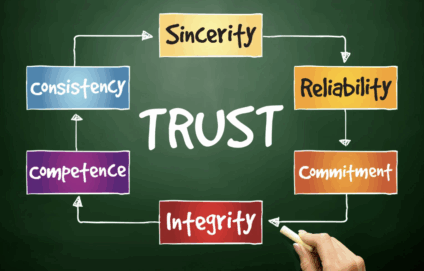Early Signs to Watch For in Teams Struggling with Trust

Trust issues rarely announce themselves with a dramatic outburst or formal complaint. In most organizations, the early signs of a trust breakdown are subtle, behavioral, and easily misinterpreted as performance problems or personality conflicts. But when you know what to look for, the patterns become unmistakable.
Here are some of the earliest red flags:
Silence Where There Should Be Engagement
- People stop contributing ideas in meetings
- Brainstorming turns into blank stares or surface-level comments
- Employees hold back thoughts they used to share freely
Trust thrives in psychological safety. When people go quiet, they’re not disengaged—they’re protecting themselves.
Defensive or Over-Reactive Responses to Feedback
- A simple suggestion triggers disproportionate emotion
- Employees interpret feedback as personal attacks
- Team members “shut down” or over-explain everything
Unhealed betrayal sensitizes the nervous system. Feedback begins to feel like a threat, not support.
Withholding, Micromanaging, or “Shadow” Work
- People hoard information instead of collaborating
- Leaders micromanage because they can’t trust delegation
- Colleagues work in silos to avoid vulnerability
These behaviors reflect a lack of trust in others—and often, in oneself.
Passive-Aggressiveness or Avoidance of Conflict
- Tension simmers without open conversation
- Feedback is delivered indirectly or through gossip
- Difficult conversations are constantly delayed or deflected
When trust is lacking, people fear the emotional cost of confrontation—so they avoid it entirely.
Inconsistency and Overcompensation
- Some team members over-function (working excessively to avoid criticism)
- Others under-function (pulling back because they don’t feel safe)
- The team rhythm feels unstable and unpredictable
These patterns often stem from betrayal trauma—either past or current—that hasn’t been acknowledged or healed.
Bonus: If You’re a Leader, Watch Yourself Too
If you start noticing:
- Irritation with your team without a clear reason
- Difficulty delegating or trusting your managers
- Feeling like you have to “do it all yourself”
- Numbing out or feeling emotionally disconnected from the team
…then unresolved trust wounds may be impacting your leadership as well.
What to Do When You See These Signs
These aren’t personality flaws or attitude problems. In most cases, they’re signs of unhealed betrayal, nervous system dysregulation, and emotional fatigue.
And they won’t go away with more meetings, more structure, or more pep talks.
They need a healing process. A path from guarded to grounded. From fractured to focused.
That’s exactly what the 5 Stages of Betrayal Recovery and the Reclaim Program are designed to support—inside individuals and across entire teams.
Next Steps
Take the leadership diagnostic assessment by clicking here to see how your team may be reacting to unhealed betrayal.
Learn how to bring betrayal recovery into your organization by clicking here.
Dr. Debi Silber, Founder and CEO of The PBT (Post Betrayal Transformation) Institute and National Forgiveness Day is a WBENC-Certified WBE (Women’s Business Enterprise) is an award-winning speaker, bestselling author, holistic psychologist, a health, mindset and personal development expert. Through a predictable, proven multi-pronged approach, Dr. Debi and her team of Certified PBT Coaches/Practitioners help people heal (physically, mentally and emotionally) from the trauma of shattered trust and betrayal. Get started on your healing here.
